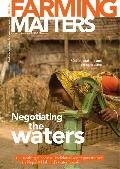This issue of Farming Matters contains many examples of people working together to manage their water resources in an efficient way. The message is important. We live in a world where the pressure on water resources is growing and where many of the surface water resources are overcommitted. Yet there are still many opportunities that are not utilised. It is this gap between crisis and opportunities that should concern us.
Farming Matters | 26.3 | September 2010
Although there are many such opportunities, one of them is to make combined use of surface and groundwater. It is not much reported that, during recent drought periods, agricultural production in several of south Asia’s mega irrigation systems went up, rather than down. This was because farmers made more effective use of shallow underlying groundwater, and suffered less water-logging.
Another option is flood-based farming systems, such as spate irrigation, currently used by millions of farmers. Better use of groundwater buffers is equally important. Discussions on the use of groundwater have often been limited to its overuse, yet much can be gained by focusing on recharge, retention and reuse efforts (the three Rs). This, in turn, is linked to moisture conservation. There is much potential to increase yields in rain-dependent areas by better soil water management, using a range of techniques, although little systematic support is given to this issue.
The common denominator is that these systems are a little more complex than conventional approaches: they involve an interaction between different forms of water and land. They require us to look at what happens on the ground and learn from local realities – and to see the ingenuity of local management or the potential for it.
This calls for an overhaul of the way we approach water management. The water harvesting community is in danger of locking itself up into seeking to “upscale small-scale solutions” and not seeing a bigger picture, where water can be buffered at scale.
The irrigation and drainage community has not been as innovative as it might have been, and is not coming to terms with the multiple functions that irrigation systems serve. The Integrated Water Resources Management community has focused overly on the process side. A huge range of opportunities is seen between and not within these communities of practice.
There is a need for a new élan in water management, a need to learn from the evidence of what is already happening on the ground, and to better understand the science behind it so as to seek new applications.
Text: Abraham Haile Mehari
Eritrean by birth, Abraham Haile Mehari is Senior Lecturer in Integrated Land and Water Development at the UNESCO-IHE Institute for Water Education. E-mail: a.meharihaile@unesco-ihe.org ; ahaile@metameta.nl

